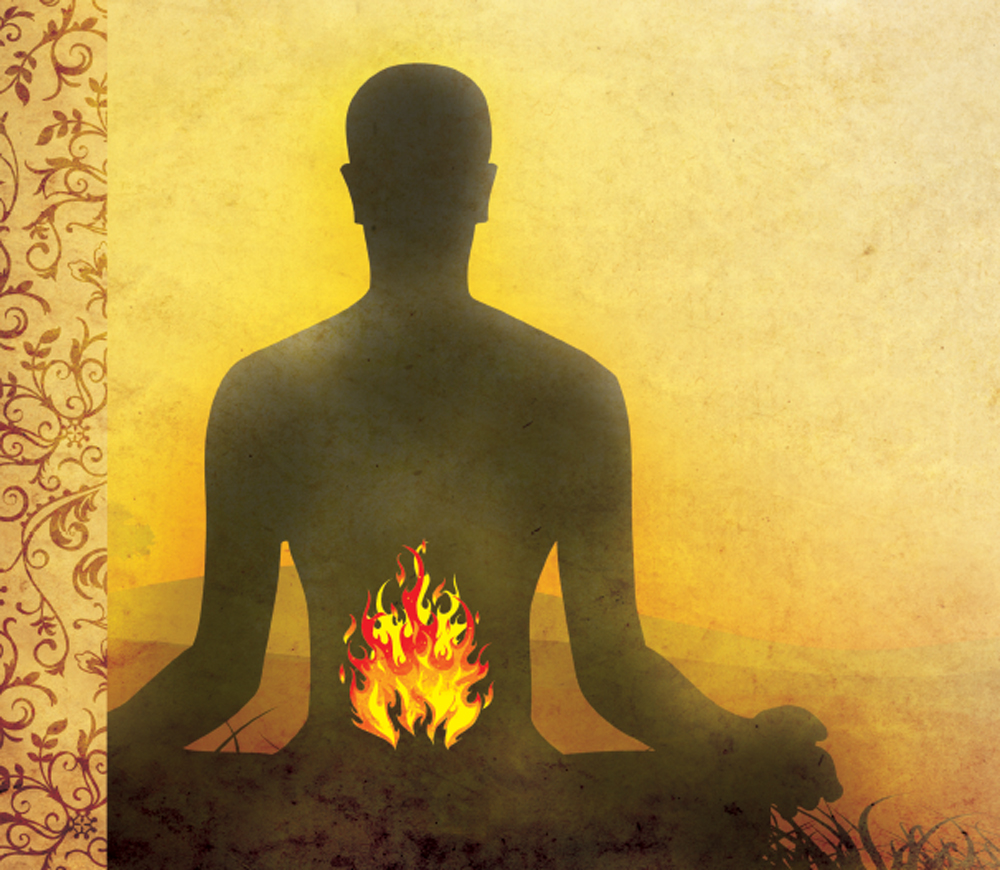Learn how nurturing your digestive powers can heal your body, mind, and emotions.
The ancient healing system of Ayurveda teaches that good health depends on the body’s ability to metabolize all aspects of life. This includes not only the food we eat but also our experiences, emotions, and sensory impressions. The metabolic power responsible for extracting nourishment and releasing toxicity is known in Ayurveda as agni – a Sanskrit word meaning “fire.” Linguistically, agni is the root of the English word “ignite,” and we can think of agni as our digestive fire.
When our agni is robust, we are able to digest food efficiently and easily assimilate our daily experiences. We
absorb what is nourishing and let go of what isn’t, which enables us to make healthy blood cells, muscle tissue, bones, and nerves. Just as a roaring blaze in a fireplace creates warmth and heat, burning even a damp log down to fine ash, strong agni in our bodies produces vitality and enthusiasm, completely “cooking” (or “digesting”) the experiences of our lives.
With weak agni, however, we can’t extract value from even those substances and events that are potentially nourishing. A weak fire generates an excessive amount of smoke, leaving behind charred pieces of wood that – to continue the analogy, are the toxic residue remaining when our digestive power is poor. This accumulated residue weakens our health and blocks the flow of energy and information throughout our body, making us feel dull and listless. An example of this is the accumulation of saturated fat and cholesterol that the body can’t metabolize, leading to the blockage of the blood vessels and arteries and, ultimately, to heart attacks. In Ayurveda, this buildup of toxins is considered the underlying cause of all disease.
While it’s easy to understand agni in terms of food, it’s important to remember that your mind and heart are continually digesting energy and information as well. If the concept of agni is new to you, your mental digestive powers are working right now to break down the idea into components your intellect can assimilate. Similarly, your emotional agni processes your experiences and feelings, including the beautiful smile of a loved one, an unexpected criticism at work, or the excitement of a new relationship. If your emotional agni is strong, you are able to extract whatever is nourishing and eliminate the rest. The inability to metabolize emotions produces just as much toxic residue as undigested food. In fact, pent-up anger, long-held sadness, and lingering guilt are more debilitating for most people than problems with physical digestion.
Given the crucial role of agni to health and well-being, how do we tend to our inner fire and keep it burning brightly? The essential step is living more consciously by making decisions that nurture the flow of life energy and minimizing choices that deplete it. (A simple way to evaluate whether or not an experience will nurture your agni is to ask yourself if you would encourage someone you love to have it.) To fuel a healthy inner fire, you need the right balance of change (represented by air) and responsibility (wood). Too much air will blow out the fire and, in the same way, if you have too much change or turbulence in your life, you won’t be able to metabolize everything on your plate. However, if you throw too much wood or a heavy log onto a weak fire, you will also extinguish the flames, just as your inner fire is weakened by a responsibility load that is too heavy—too many financial commitments; too many complicated, demanding relationships; or too much clutter in your home. When you take in more than your life can digest, the consequences may be weight gain, depression, or other health problems. Not enough change will cause stagnation, creating similar symptoms. On the other hand, not enough responsibility causes symptoms similar to having too much change.
Take care of your inner fire. Look at your choices and see if there is a way to simplify. Balance activity with rest by meditating and getting replenishing sleep each night. Ask yourself, “What am I carrying with me from the past that is no longer serving me?” and “What would I like to bring into my life that I have previously neglected?” Making choices that awaken your digestive fire will serve you and those around you in all aspects of your life.
Evaluating your digestive fire
Ayurveda describes the net effect of an experience as producing either ojas or ama. Ojas is the essence of nourishment that supports every cell in the body and thought in the mind, and ama is the by-product of incomplete metabolism that leads to stagnation and distress. Review the signs of ojas and ama in the chart below.
If you recognize that you’ve been accumulating more toxicity than nourishment, commit to making choices that reflect the self-care you deserve.
Nurture your inner fire
Try using the practices listed below consistently for the next few weeks. If you don’t notice substantial improvements, the next step to consider is Panchakarma, a powerful Ayurvedic therapy that releases toxins from deep within the bodily tissues.
Create nurturing mealtimes
Our experience while we’re eating is just as important as the kinds of foods we’re consuming. If we’re having a fight with our spouse over the dinner table, our stomach cells are aware of the upset and send distressed chemical messages throughout the body, preventing complete digestion and creating toxic residue in our body. To stoke our inner fire, we need to create a nurturing atmosphere for our meals, paying attention to all of the senses: taste, sound, sight, touch, and smell. Here are a few tips for making your body happy while you eat:
Eat in a settled and quiet atmosphere. When you eat, your attention should be on the food, so that you can enjoy the delightful flavors and fully activate your digestive system. Don’t eat meals in front of the TV or computer or while you are driving. Don’t eat when you’re upset. If you are feeling angry or distressed, your digestion will be weakened. Postpone your meal by going for a short walk or doing something you enjoy until you feel calm again. Always sit down to eat. Even if you are just going to eat a few grapes or a cracker, take the time to sit down at a table. Pay attention to what you are doing and don’t rush. Only eat when you’re hungry. Putting food in your body when you’re not really hungry dampens the digestive fire and creates toxic residue. Avoid ice-cold food and drinks. Cold beverages and foods tend to freeze the digestive fire, preventing complete digestion and absorption of nutrients. This is especially true of ice-cold food and drinks. You may be in the habit of drinking ice-water or other cold drinks, but if you eliminate them, within a few weeks you will find that your body feels much better and that you no longer miss them. Sit quietly for a few minutes after your meal. This allows your body to settle effortlessly into its digestive rhythm.
Signs of Ojas Signs of Ama
You feel rested upon awakening Bad breath
Your skin has a healthy glow Coated tongue
Your tongue is clear and pink Dull appetite
Your body feels light, regardless of the number on the scale Delicate digestion
You feel centered throughout the day Sluggish or irritable elimination
Your digestion is strong without bloating Generalized pain
You feel energized and enthusiastic Fatigue
Your mind is clear Depression
Your body has a pleasant smell Susceptibility to infections
You rarely get sick Difficulty manifesting intentions
Eat a balanced diet
In Ayurveda, a balanced diet is one in which the six tastes of sweet, sour, salty, pungent, bitter, and astringent are included in every meal. Ayurveda tells us that each of the tastes has a unique effect on our mind-body physiology and provides the flavor that makes eating a pleasure and aids digestion. Including all six tastes in a meal will give you the nutrients you need and make you feel completely satisfied and energized.
Unclutter your life
Inner fire is weakened by having too much wood or “stuff ” in your life – too much debt, too many financial commitments, too many complicated, demanding relationships, and too much clutter. Consciously survey your life and ask yourself, “What am I carrying with me from the past that is no longer serving me in the present, and what would I like to bring into my life that I have previously neglected?”

Meditate to release accumulated stress
Even when they realize it isn’t logical, many people spend a lot of time ruminating about the past and worrying about the future. Worrying about the future is like paying interest on a loan that you haven’t taken out – and it can create emotional toxicity or ama. The way out of this cycle is finding opportunities to enter into present moment awareness.
Meditation is one of the most effective technologies for quieting the mind and calming the chemistry that creates feelings of stress. A twice-daily practice of meditation is ideal. By meditating in the morning, you refresh your mind with the healing power of silence, and when you meditate in the evening, you can let go of the tensions of the day so that they can’t build up and weaken your inner digestive fire.
Give yourself an oil massage
At least once a day, give yourself a body massage using an oil suited for your personal dosha or mind-body type. After the massage, lie down for five minutes. Bring your attention to your gut feelings and send your digestive system the intention to be soothed.
Do a gentle 7-day cleanse
Taking a week to detoxify your body will help release the toxins that are hampering your digestion. Your body will feel refreshed and your mind will feel delightfully clear.
Experience emotional release
We need to purify both emotional and physical toxins on a regular basis in order to experience true health and emotional freedom. Addressing emotional toxicity is the first step to total rejuvenation – if we allow toxic
emotions to accumulate, the emotional toxicity ultimately leads to physical toxicity as well. Whenever you carry resentment, hostility, regret, or grievances in your heart, your health and vitality are eroded.
One of the most powerful ways to release emotional upset is to go out of your mind. Instead of trying to figure out what the emotion is about, you can connect to the sensations in your body, which has a natural instinct to discharge pain and heal.
Take a few deep breaths, sit quietly, and feel the sensations in your body. You might feel a tightness in your chest, a stiffness in your shoulders, or some other manifestation of the upsetting emotion.
Feel the sensation without judging it. Just be with it.
Allow any feelings, thoughts or energies that arise. You may hear the voices of anxiety, anger, fear, or regret. Let the voices say what they want to say. Listen with compassion and understanding.
Feel the energy of the emotion dispersing as much as it can, without demanding a complete release. Know that body will let go of as much stored emotion as it is able to.
In a few hours or the next day, repeat the process. You will gradually release the toxicity of stored emotions and open your heart to the present moment.
Every emotion has a beginning and an end. Like an ocean wave, even the most painful feeling crests and dissipates. In confusion, however, people often block the natural flow of emotions by clinging to resentment, hurt, hostility, regret, or grievance. As the ancient seers observed, while pain is unavoidable, suffering – which is simply pain that we hold on to – is optional.
 David Simon, M.D. is a world-renowned authority in the field of mind-body medicine. As a board-certified neurologist and expert in Ayurvedic medicine and other traditional healing arts, he brings a unique perspective to the relationship between mind, emotions, and health. In 1996 he partnered with Deepak Chopra, M.D. to establish the Chopra Center for Wellbeing in Carlsbad, California (San Diego County). David is the medical director and CEO of the Center, where he continues to serve as the driving force in developing and leading the Center’s programs and seminars in mind-body medicine, emotional healing, meditation, yoga, and spirituality. www.chopra.com
David Simon, M.D. is a world-renowned authority in the field of mind-body medicine. As a board-certified neurologist and expert in Ayurvedic medicine and other traditional healing arts, he brings a unique perspective to the relationship between mind, emotions, and health. In 1996 he partnered with Deepak Chopra, M.D. to establish the Chopra Center for Wellbeing in Carlsbad, California (San Diego County). David is the medical director and CEO of the Center, where he continues to serve as the driving force in developing and leading the Center’s programs and seminars in mind-body medicine, emotional healing, meditation, yoga, and spirituality. www.chopra.com




